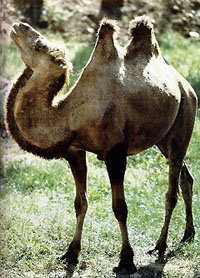| About China > Fauna & Flora > Class I Animals > Mammalia |
|
|
Wild Camel
With the alias of Two-humped Camel, it
belongs to the Camelidae family of Artiodactyla order. Its Latin scientific name
is Camelus ferus, and English name is Bactrian Camel or Two-humped
Camel.
It is a large-size Artiodactyl, with high and huge body that is much like domesticated two-humped camels. It has small head and short ears, with a split in the middle of the upper lip and valves in nostrils to protect against wind-blown sand. It has two humps on the back and comparatively short tails. Its four limbs are slender, with wide and thick meat pillows under the feet soles. The whole body is covered by dense and soft fuzz in light brown yellow, with the mouth hair in slightly gray, and tips at elbow joint in brownish black, tail hair brown yellow.
It lives in Gobi deserts. It is tame, alert, tenacious, and sensitive, with swift and persistent running velocity, and able to endure thirst and hunger, coolness and heat. As early as 2,000 years ago, domesticated two-humped camels were vehicles on Chinese ancient "Silk Road".
Wild Camel is characterized by seasonal migration as well as day and night traveling. It mainly feeds on red willow, camel thorn, splendid achnatherum, white thorn and other plants, with the habit of looking for a comparatively tranquil place after each meal, lying down and taking a rest for rumination. Its estrum period is March, and gestation period lasts 13 months. It breeds once every 2 years, one baby per fetus. It grows to sexual maturity at the age of 4 to 5, and has a lifespan of 30 to 50 years.
Wild Camel is distributed in Inner Mongolia Autonomous Region, Gansu Province, Qinghai Province, and Xinjiang Uygur Autonomous Region. |
||||
 |
